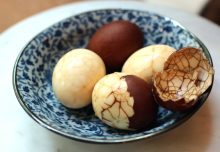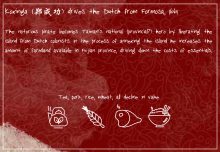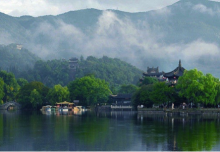“The winds howl sadly and the waters of the Yi River are frozen. Brave men, once gone, Never come back again.”
“风萧萧兮易水寒,壮士一去分不复还。”
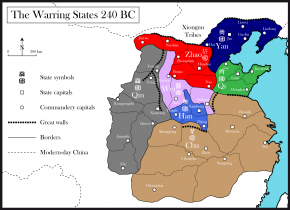 In the historian Sima Qian’s 86th chapter of his “史记” (or “Historical Record”), the would-be-assassin, Jing Ke sings these words as he departs the State of Yan and crosses the Yi River towards the States of Zhao and Qin. Tears stream down the faces of those who see Jing Ke off. His mission: to assassinate the Qin Emperor. For years, the Seven Warring States have been falling into and out of battles. The strongest of the seven states, Qin, is ruled by a power-hungry dictator who seeks immortality. He will later be known as Qin Shihuang, literally the “first August emperor” who unites China in 221 BC after he conquers and subdues the other seven states. But first, he must deal with the State of Yan, and the man sent to kill him.
In the historian Sima Qian’s 86th chapter of his “史记” (or “Historical Record”), the would-be-assassin, Jing Ke sings these words as he departs the State of Yan and crosses the Yi River towards the States of Zhao and Qin. Tears stream down the faces of those who see Jing Ke off. His mission: to assassinate the Qin Emperor. For years, the Seven Warring States have been falling into and out of battles. The strongest of the seven states, Qin, is ruled by a power-hungry dictator who seeks immortality. He will later be known as Qin Shihuang, literally the “first August emperor” who unites China in 221 BC after he conquers and subdues the other seven states. But first, he must deal with the State of Yan, and the man sent to kill him.
…
When I arrive in Yi County, its roads are not clearly marked. Large trucks make potholes in the ground even larger, threatening to swallow my rental car whole. There’s a constant swirling of dust in the air, and the roads are not well marked. I thank my stars and garters its daytime. I’m on the way to visit Jing Ke Tower, which was built in the Liao Dynasty (907-1125) in order to commemorate Jing Ke and his attempted assassination of Qin Shihuang. The roads show no sign of ancient relics. However, just like everything else in Hebei, one only has to huff and puff and blow back the dust and there they are…tales of past heroes. Fallen States and Empires. Souls in everlasting turmoil.
…
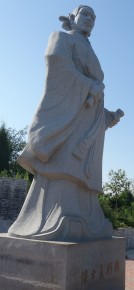 Jing Ke’s mission is pretty much a shot in the dark. He and his accomplice, Qin Wuyang have a plan so simple it just might work: they simply hope to walk into the palace with a hidden poisoned dagger and stab the man who will become Qin Shihuang to death. They only need to offer the emperor just the right bait in order to gain access to a private audience with him. They carry a strategic map of the State of Yan to present to the emperor. In addition, they also carry a box containing the head of the general Fan Yuqi. Fan Yuqi was formerly a general in the service of Qin Shihuang; however, he fell out of favor and fled to the State of Yan. Upon hearing this, Jing Ke approached the former general and told him he only needed one thing to get close enough to the emperor in order to kill him:
Jing Ke’s mission is pretty much a shot in the dark. He and his accomplice, Qin Wuyang have a plan so simple it just might work: they simply hope to walk into the palace with a hidden poisoned dagger and stab the man who will become Qin Shihuang to death. They only need to offer the emperor just the right bait in order to gain access to a private audience with him. They carry a strategic map of the State of Yan to present to the emperor. In addition, they also carry a box containing the head of the general Fan Yuqi. Fan Yuqi was formerly a general in the service of Qin Shihuang; however, he fell out of favor and fled to the State of Yan. Upon hearing this, Jing Ke approached the former general and told him he only needed one thing to get close enough to the emperor in order to kill him:
Fan Yuqi’s severed head.
When Fan Yuqi hears this, he wastes no time and cuts his own throat, sacrificing himself. Jing Ke and Qin Wuyang now have the perfect gifts for Qin Shihuang. Surely, they can get close enough to the tyrant to strike him down.
…
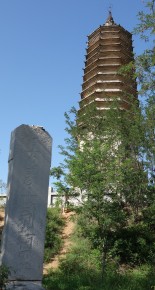 Jing Ke tower is just on the outskirts of Yi County. At the bottom of the park is a gigantic square filled with all sorts of games and chemically charged sausages one can find at any park in China. There are fun cars for children to ride, mothers walking babies in a stroller. I buy a green bean flavored ice cream. Handing over my money to the vendor I have to shield my eyes from the reflection of the sun’s light as it bounces off the skin of one of the sausages on the rolling steamers. As I walk through the square and up the stairs, I pass a statue of Jing Ke. He’s surrounded by poems, each one depicting different versions of his story. He looks off towards the horizon, one hand on a scrolled map perhaps, the other on the hilt of his sword.
Jing Ke tower is just on the outskirts of Yi County. At the bottom of the park is a gigantic square filled with all sorts of games and chemically charged sausages one can find at any park in China. There are fun cars for children to ride, mothers walking babies in a stroller. I buy a green bean flavored ice cream. Handing over my money to the vendor I have to shield my eyes from the reflection of the sun’s light as it bounces off the skin of one of the sausages on the rolling steamers. As I walk through the square and up the stairs, I pass a statue of Jing Ke. He’s surrounded by poems, each one depicting different versions of his story. He looks off towards the horizon, one hand on a scrolled map perhaps, the other on the hilt of his sword.
When I reach the top, the tower looms overhead, standing as it has stood from the Liao Dynasty. Erected in remembrance of the hero that never was, I look up at its subtle layers. Two Chinese visitors have etched their names into one side of the tower. I read their names, “Zhang Bo,” and “Zhang Bao Liang.” Perhaps they are father and son. They share the same name. Whatever possessed them to chisel their names into the side of Jing Ke’s tower? Were they assassins as well? Or were they just bored?
I walk behind the tower and towards the mountains. The dusty haze doesn’t hover in that direction. I want to go on, but time is short and there is one more site I need to see…just to see if IT is really there…
…
Qin Shihuang is absolutely delighted when he hears of the two visitors from Yan bringing a strategic map as well as the severed head of the traitorous general, Fan Yuqi. He invites the two to enter his palace and present their gifts. His reach has almost extended across all seven states, and like a juggernaut, there is nothing that can stop him.
As they enter the palace and walk towards the emperor, Jing Ke’s accomplice, Qin Wuyang, suddenly freezes in his tracks when he looks up. This is the August Emperor, the man who has conquered all the states he has gone to war with.
What the hell am I doing here?
Jing Ke takes the box with Fan Yiqi’s head and opens it for the emperor to see. Qin Wuyang is still frozen in his tracks with the map. The poisoned dagger is inside.
“This young boy is only a barbarian…he has never laid eyes on the Son of Heaven. This is why he is frightened.”
“Show me the map,” says the emperor.
Jing Ke opens the map and immediately grabs the knife within. He strikes at the emperor but only cuts his sleeve. Dumbfounded, the surrounding guards do not know what to do. They have no weapons as none are allowed in the emperor’s presence. Jing Ke pursues the emperor as he hides behind a palace pillar. The emperor’s sword is too long and he cannot take it from his scabbard immediately. A palace physician, Xia Wuju, takes action and hits Jing Ke with his medicine bag. This distracts Jing Ke long enough for the emperor to remove his sword. He steps forth and slashes Jing Ke in the thigh. In one final desperate act, Jing Ke throws the knife at the emperor and misses him, hitting a pillar behind. The emperor finishes him off, wounding him eight times.
No more games.
Within 5 years, Qin will destroy the State of Yan. In 221 he unites the empire and proclaims himself the “August Emperor,” Qin Shihuang.
…
The turnoff from the main road is impossible to know about without GPS or the assistance of a local. My colleague, Xiao Hong, is from Yi County. Her cousin works at the local government’s medical bureau and knows what I’m looking for.
“I’ll take you there,” he says, “but there’s really nothing…”
I’ve heard those words before. I’m stubborn and I want to see IT for myself. We drive some minutes down a small two-lane road. Weeping willow trees lean out over the road, sweeping taller vehicles with their leaves.
“Wait…turn here,” he says. It’s too late. I’ve gone past. I turn on my hazard signal and back up about 5 meters to turn right down a gravel and dirt road. We drive down the road for about 5 minutes. I scrape the bottom of the rental car on a large bump. Nothing falls off the car. Slowly, in the distance I see IT. On the left is a trash heap in the forest. On the right, covered by a makeshift protective roof and crumbling waist-high concrete fence are the remnants of the city walls of the State of Yan. Destroyed entirely by 221 BC, the wall still stands. A group of boys sit in the shade of the wall, their bicycles leaning against it. One of them smokes a cigarette.
“You guys protecting this thing?” I ask, jokingly.
They laugh.
We walk along the wall. It goes on through the forest. It IS part of the forest, its top and sides overgrown with jujube plants, red and ripe. It continues towards neighboring farms. The boys bike away. Will they return? Probably. Just a place to hang out for a cigarette now. Within 10 minutes drive of the wall lies the Yi River, once frozen and waiting for brave men to “never return,” it is now mostly dry and dug up for gravel, sand, and concrete. We walk along the wall. The only sound is the wind and our feet stepping in the dirt.
I will come back again.

